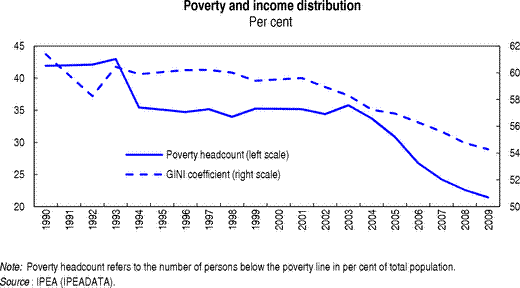The conference in general seems very slow-paced. There were 15-minute breaks between sessions, despite the fact that all events were on one floor of a moderate-sized hotel–a definite contrast to Berklee giving us all 10 minutes to, in some cases, walk several blocks! We also got a 105-minute lunch!
After the first sessions was the Distinguished Address: :Brazil in Transition: Beliefs, Leadership, and Critical Transitions” by professor Lee Alston of Indiana University.
The talk brought back echoes of the excellent book Why Nations Fail. He spoke of the importance of institutions in a country, that the elite always wants to set things up in their interest and preserve a dysfunctional status quo, but that every now and then you can get a “virtuous cycle” in which reforms beget other, stronger reforms. The speaker gave a lot of credit to Cardoso (1994-2002) for starting real economic reforms and Lula (2002 – 2010) for continuing them–extra important as they were from different political parties. He was a bit more skeptical of Dilma (Lula’s successor), but was very much “wait and see.”
(Note that “GINI coefficient” is a measure of inequality.)
Overall, Brazil has been getting a lot better over the last couple of decades, with inequality, instability, and poverty both falling and economic activity rising. The speaker also pointed out that under president Lula the limited budget went mostly toward education (“human capital”) rather than infrastructure (“physical capital”). In the speaker’s view, this will pay off down the road. I hope he’s right! I personally wonder if more could have been done through higher taxation, but in any case gradual improvement beats stagnation or decline.
After that talk and a ridiculously long lunch (which I used to curl up in an empty room and grade), I attended a session titled “Growth theory and Models.”
 Here’s a slide from one talk, which I think was about sustainable development, but mostly served to remind me of why I bagged grad school in economics–the fetish for taking a very simple concept and making it into a mathematical monstrosity. Thomas Piketty agrees!
Here’s a slide from one talk, which I think was about sustainable development, but mostly served to remind me of why I bagged grad school in economics–the fetish for taking a very simple concept and making it into a mathematical monstrosity. Thomas Piketty agrees!
Next there was a too-cute-by-half talk by someone who pointed out the catch-up effect and said that if you declare that yearly per-capita GDP growth “should be” inversely proportional to the size of GDP. (For example, a country twice as productive grows half as quickly) then the first-world countries’ growth looks pretty good compared to China and other less wealthy countries. Well, yeah, but saying that growth “should be” slower is one thing, but shoehorning it into a simple inverse proportion formula seems to me like a massive assumption justified by neither theory nor practice.
A third speaker talked about the effect of protests on economic growth. An interesting concept, but it was so hard for him to get data and really do an apples-to-apples comparison that the already-tenuous results of the study were pretty questionable. (He found that most protests were associated with lower growth, but the effect was very small.)
Fortunately, this somewhat-disappointing second panel was followed by a very good plenary symposium, to be detailed next time. Stay tuned!

